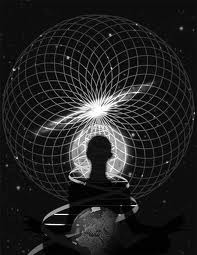Toward a New Theory of Consciousness
 I received a highly gratifying note from Donald Padelford yesterday. He liked Fringe-ology, and as it turns out I like where he is headed with his paper, "Consciousness in Evolution: Sketch for a New Model—A Speculation."
I received a highly gratifying note from Donald Padelford yesterday. He liked Fringe-ology, and as it turns out I like where he is headed with his paper, "Consciousness in Evolution: Sketch for a New Model—A Speculation."
He sent his email address so I plan to contact him and maybe we can do a Q&A online. But here is a quick taste of his paper:
"Starting with Galileo, the thrust of science has been to construct a model, a predictive model, of a non-theistic universe, which is to say one devoid of the supernatural and of 'magical thinking.' How do things work? And no need for any frig'n ghosts (or Ghost) in the machine either. Which brings us back to the assumption that matter/energy creates consciousness. As a starting point, I want to question that assumption. In particular, I want to explicate a dual approach in which matter/energy affects consciousness, and consciousness affects matter/energy (and without trying to decide which is the ultimate 'top dog'—a largely futile task) in somewhat the same sense that matter can be converted to energy and vice versa. I think that there is plenty of evidence that this dual view better fits the facts. I would even go so far as to say that the way orthodox science has dealt with some inconvenient data is to simply ignore (or suppress) it. Those familiar with the philosopher of science, Thomas Kuhn, will recognize this as a well-worn pattern: if the data do not fit the reigning paradigm, dump data in the river. Those with longer historical memories will recognize that this was also exactly how the (Catholic) Church initially dealt with the early empiricists, albeit the Church admittedly had tools of persuasion that are thankfully unavailable to the reductionist orthodoxy of today."
Padelford's idea is that consciousness is not only "real"—many modern philosophers consider it an illusion—but that it has a hand in the evolutionary process. If Padelford got a wide reading, he would likely trigger a lot of controversy. He aims numerous verbal darts at some particularly prominent scientists and range of orthodox views on matter and consciousness and the relationship between them.
Trust me, this isn't giving away too much of his 35-page paper, which can be found here. So check out a couple of quick examples of his willingness to mix it up.
"At a conference on the conflict between (orthodox) science and religion (Beyond Belief, 2006, viewable on the web) the assembled chuckled at the story of a petroleum geologist who in his professional capacity obviously understood that the precursor materials for oil deposits were laid down hundreds of millions of years ago, but who in his private life believed that life was put on earth 6,000 years ago. These same assembled did not, however, seem to find any contradiction (or humor) between their idea that, as reductionists, they purportedly have no free will, and their idea that they 'should' spread scientific thinking. 'Should'? Either your garage door opener works or it doesn't. You don't tell it what it 'should' do. Should implies choice, and reductionists (sophistic arguments of certain philosophers to the contrary notwithstanding) don't believe that choice, and free will, exist. Like the geologist, they believe in contradictory propositions, each of which is 'common sense,' at least in their world."
And:
"The emergent view is that of, for instance, the philosopher (I would even call him a practitioner of natural philosophy) Daniel Dennett in his book, Darwin's Dangerous Idea. Make a machine complex enough, and somehow it acquires consciousness and autonomy: 'you can transcend your genes … to build an almost entirely independent … locus of meaning on the base your genes have provided' (Dennett, 1995, p. 426). In his view, determinism and autonomy are consistent, which I would call a close cousin to the concept that freedom and slavery are the same thing."
Steve Volk's Blog
- Steve Volk's profile
- 18 followers



